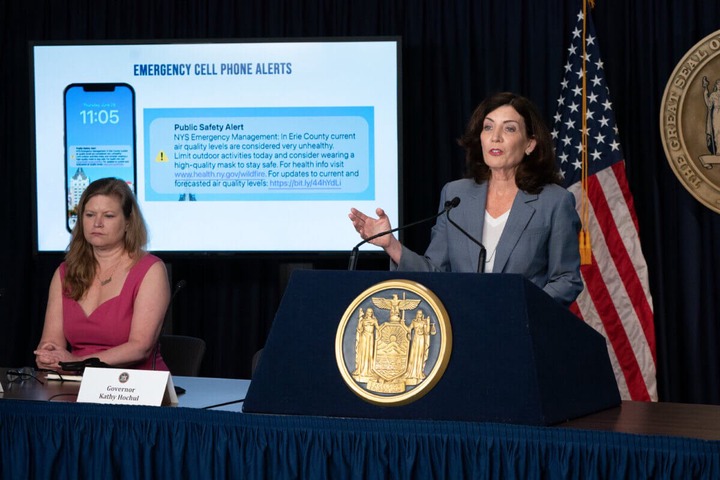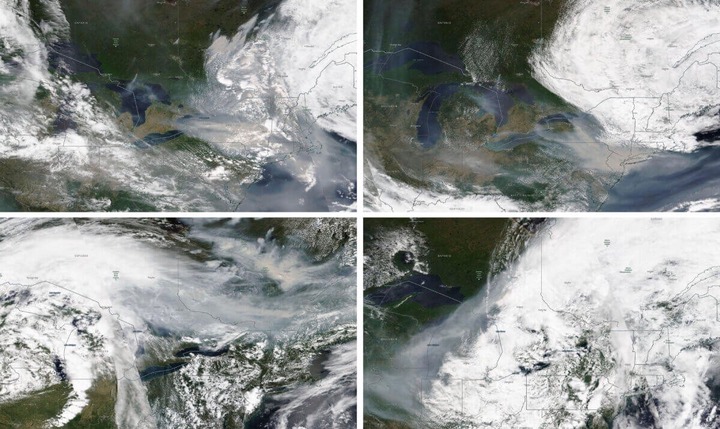AIR QUALITY ALERT | Smoke-filled haze returns to NYC, prompting new round of health warnings

Summary: Acrid smoke from Canadian wildfires has once again enveloped New York City, prompting air quality alerts, particularly for vulnerable individuals. While the air quality index (AQI) reached levels considered “unhealthy for sensitive groups,” it is not expected to reach the extreme levels experienced on June 7. Governor Kathy Hochul and Mayor Eric Adams urged residents to take precautions, emphasizing the need to adapt to this “new normal.” The state has implemented a text alert system, distributed masks, and transit agencies will provide updates. The situation serves as a stark reminder of the perils of climate change impacting the city.

As acrid smoke from the devastating Canadian wildfires descended upon New York City once more, a wave of concern rippled through the air. The deteriorating air quality has triggered a fresh round of alerts, urging particular caution for those most susceptible to the haze laden with particulate matter.

Throughout Thursday, New York’s air quality steadily declined, mirroring the predicted trajectory as the wildfire smoke, lingering over the Midwest for days, made its way eastward. Starting the day with a moderate air quality index (AQI) of around 90, the number rose to 105 by 2 p.m., with expectations of climbing into the 150s. These levels are deemed “unhealthy for sensitive groups” by the Environmental Protection Agency.
Thankfully, experts do not anticipate the pollution reaching the noxious levels experienced on June 7, a day etched into the collective memory of New Yorkers. The city was engulfed in an unforgettable, apocalyptic orange haze as the AQI soared into the upper 400s range, posing extreme health risks. At that moment, New York City had the dubious honor of possessing the most polluted air among all cities worldwide.
Nevertheless, despite the relative respite, Governor Kathy Hochul and Mayor Eric Adams took a proactive stance, advising residents to take necessary precautions against the prevailing smoke. They highlighted the potential harm it could cause, particularly to children, seniors, and those with heart or lung conditions. Such vulnerable groups were urged to limit outdoor activities and wear N95 masks while venturing outside.
Governor Hochul acknowledged the inconvenience but stressed the need to adapt to this latest “new normal.” Forecasts indicate that the smoke will persist across parts of the state until at least Friday.
“You’re going to start feeling the effects of what we’re talking about right now, if not already,” Hochul empathized. “And again, much of this weather is going to be lingering across the state all the way through tomorrow. So, we’ll be expecting to have another air quality alert tomorrow.”
To ensure New Yorkers remain well-informed, the state has activated a text alert system that notifies cellphone users if the AQI in their area exceeds 200. (apnews.com) Transit agencies, including the Metropolitan Transportation Authority (MTA), will make public service announcements within their systems to keep commuters informed about current smoke levels.
In a proactive move, hundreds of thousands of masks are being distributed throughout New York state. In New York City, individuals can acquire N95 masks at their local police precincts or firehouses, with additional availability at the city’s Neighborhood Health Action Centers.
Mayor Adams acknowledged that the recurrence of smoke serves as another poignant reminder of the perils of climate change impacting the city. Wildfires have ravaged Canada since the beginning of the year, fueled in part by an unusually hot, dry, and prolonged weather pattern, as highlighted by the National Oceanic and Atmospheric Administration’s Weather Prediction Center. (airnow.gov)
With approximately 235 wildfires still burning out of control in Canada, Mayor Adams emphasized the astonishing reach of the distant fires and the urgent need to address climate change. (amny.com)
“It (amny.com) (amny.com) (nyc.gov) still amazes me that a fire that’s thousands of miles away is impacting the city in this manner,” Adams remarked. “It (amny.com) (amny.com) (nyc.gov)
just really, again, emphasizes the importance of dealing with our climate.”
As New York City grapples with the recurring specter of wildfire smoke and its dire implications for public health, it is a somber reminder that the consequences of climate change are not a distant threat. They are upon us, demanding swift and resolute action. The resiliency of this great city hinges on our collective commitment to confronting the challenges posed by our changing environment and forging a sustainable future.